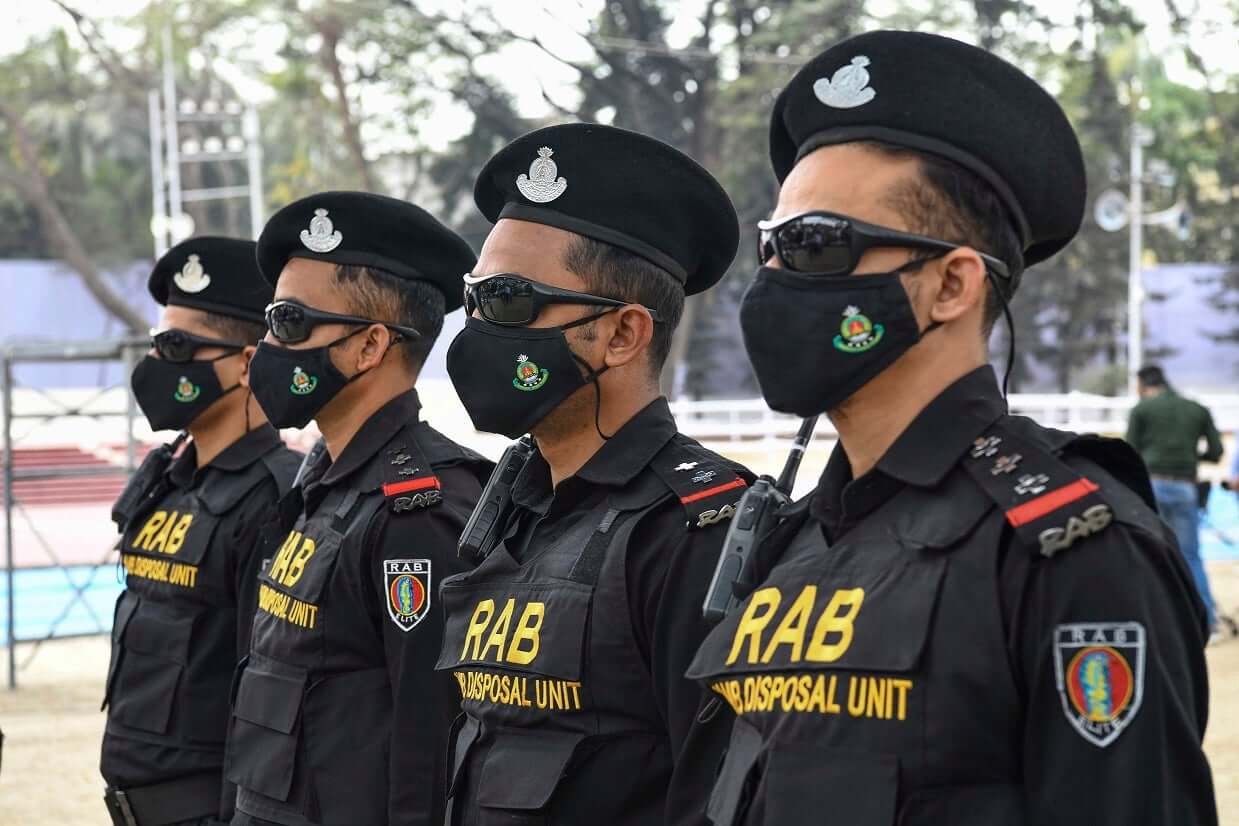The United States (US) has imposed sanctions on an elite Bangladeshi paramilitary unit and two Sri Lankan military officers over human rights abuses.
In a statement released on Friday, the US Treasury said that it was sanctioning officers of Bangladesh’s Rapid Action Battalion (RAB), including its current and former director generals, for “serious” human rights abuses committed as part of the government’s war on drugs. The Treasury noted that the sanctions were imposed because the RAB’s actions “threaten US national security interests by undermining the rule of law and respect for human rights and fundamental freedoms, and the economic prosperity of the people of Bangladesh.”
The statement added that decision was based on reports by several non-governmental organisations alleging that the RAB is responsible for more than 600 disappearances since 2009, almost 600 extrajudicial killings since 2018, and torture. The statement also mentioned that the RAB has targeted opposition party members, journalists, and human rights activists.
The Treasury said that the sanctions on the RAB were part of the “Global Magnitsky Human Rights Accountability Act.” The Act was adopted by the US in 2012 to punish Russian officials responsible for the death of Russian lawyer Sergei Magnitsky in 2012 and since 2016, the Act has been extended to sanction global human rights offenders.
Today, on International Human Rights Day, Treasury’s OFAC is designating 15 individuals & 10 entities for their connection to human rights abuse, including technology-enabled abuse, & repression in several countries around the globe.https://t.co/Xh9kSK0sDz
— Treasury Department (@USTreasury) December 10, 2021
Bangladesh strongly criticised the sanctions, and its Foreign Ministry tweeted on Saturday that Foreign Secretary Masud bin Momen “regrets” the US decision because the RAB has been at the “forefront of combating terrorism, drug trafficking and other heinous transnational crimes,” which are “considered to be shared priorities” with the US.
Momen also dismissed US claims that the RAB had killed 600 people, saying that “we have no information” of who was killed. “I would expect from [the] USA a more solid fact-based response,” he retorted. The Foreign Ministry also summoned US Ambassador Earl R. Miller on Saturday to express its displeasure over the move.
On this #HumanRightsDay, we are designating 12 officials for their involvement in gross violations of human rights. As part of our commitment to put human rights at the center of U.S. foreign policy, we will continue to promote accountability for human rights violators.
— Secretary Antony Blinken (@SecBlinken) December 10, 2021
Additionally, US Secretary of State Antony Blinken on Friday announced sanctions against two Sri Lankan military officers under the 2021 Department of State, Foreign Operations, and Related Programs Appropriation Act for alleged human rights abuses.
Blinken said that one of the officers sanctioned was Chandana Hettiarachchi, a naval intelligence officer, for his involvement in “flagrant denial of the right to liberty” of the ‘Trincomalee 11’ victims. The ‘Trincomalee 11’ case relates to the abduction and murder of 11 Sri Lankan Tamil youths by the Sri Lankan navy between 2008 and 2009.
Sunil Ratnayake, a former staff sergeant of the Sri Lankan army, was also sanctioned, with Blinken saying that Ratnayake was involved in the “extrajudicial killings of at least eight Tamil villagers in December 2000.” Ratnayake was sentenced to death in 2015 by a Sri Lankan court for his role in the murders and the verdict was confirmed by the country’s Supreme Court in 2019. However, he was pardoned by Lankan President Gotabaya Rajapaksa last year.
The US has previously taken stringent measures to address alleged war crimes committed against Sri Lankan Tamils by the military during the decades-long civil war against the Liberation Tigers of Tamil Eelam (LTTE). In 2020, Washington imposed sanctions on current Sri Lankan army chief Gen. Shaivendra Silva for war crimes committed against the Tamil minority in 2009.
Sri Lanka has previously rejected US sanctions and international criticisms of its conduct during the 26-year civil war that ended in 2009, despite evidence of massacring tens of thousands of people and other flagrant human rights abuses. In June, Sri Lanka opposed a US resolution calling for “international cooperation to ensure justice and accountability” for the violence perpetrated against the country’s Tamil community.
The US Treasury and State Department also announced sanctions against several other individuals and entities “for their connection to human rights abuses and repression” in several countries, China, North Korea, Myanmar, Uganda, and Mexico.

